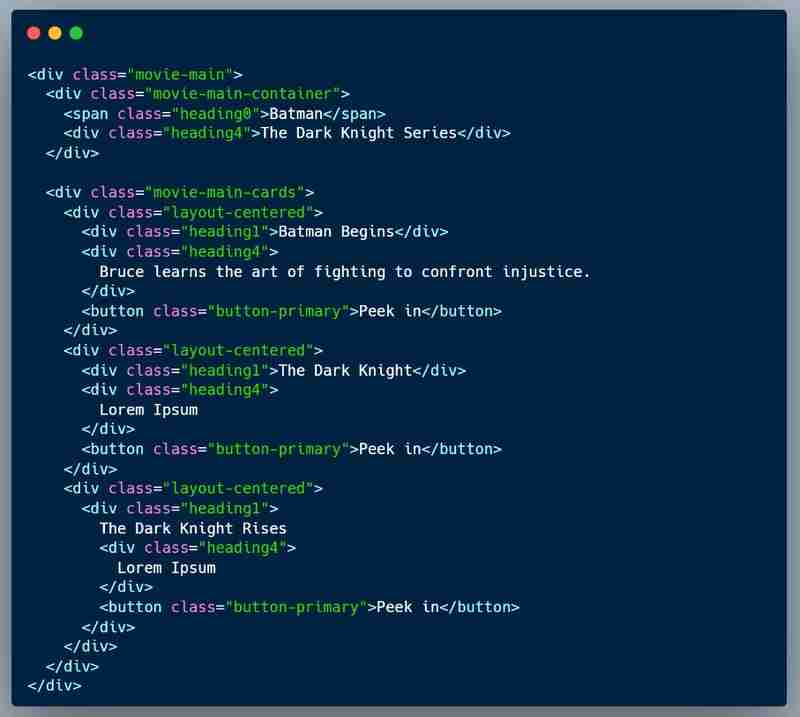
If you're developing websites, you're likely writing a lot of text in the component templates:

Writing text like this is not broken or buggy but rather tiresome to maintain for long-running projects. To improve this, you can create a file containing all the text for a particular feature and reuse it throughout the app by importing the correct keys.
This file can be:
I'll describe the pros and cons of both approaches.
In the root directory of your project, go to src/assets and create a new folder (wording) and a JSON file (wording.json):
? src |__ ? assets |_____ ? wording |_______ wording.json
And add your translations:
{
"APP": {
"TITLE": "Movies App",
"DESCRIPTION": "The best site for movies"
},
"COMMON": {
"BUTTON": "Peek In"
},
"MOVIES": {
"BATMAN": {
"TITLE": "Batman",
"SERIES": {
"THE_DARK_KNIGHT": {
"TITLE": "The Dark Knight Series",
"MOVIES": {
"BATMAN_BEGINS": {
"TITLE": "Batman Begins",
"DESCRIPTION": "Bruce learns the art of fighting to confront injustice."
},
"THE_DARK_KNIGHT": {
"TITLE": "The Dark Knight",
"DESCRIPTION": "Lorem Ipsum"
},
"THE_DARK_KNIGHT_RISES": {
"TITLE": "The Dark Knight Rises",
"DESCRIPTION": "Lorem Ipsum"
}
}
}
}
}
}
}
If needed, add resolveJsonModule: true to tsconfig.json compilerOptions to allow importing JSON files into ECMAScript modules:
{
"compilerOptions": {
"resolveJsonModule": true, // Add this line to tsconfig.json
}
}
Import the file directly into the component
// component file
import wording from '../../assets/wording/wording.json';
@Component({...})
export class HomeComponent implements OnInit {
public pageText!: any;
ngOnInit(): void {
this.pageText = wording.MOVIES.BATMAN;
}
}
Or create a service that imports all wording globally:
// translations.service.ts
import { Injectable } from '@angular/core';
import { HttpClient } from '@angular/common/http';
@Injectable({
providedIn: 'root'
})
export class TranslationsService {
public wording!: any;
constructor(private http: HttpClient) {
this.setTranslations();
}
private setTranslations() {
this.http.get('./assets/wording/wording.json').subscribe(data => {
this.wording = data;
});
}
}
And then inject the service into your component.
@Component({...})
export class HomeComponent implements OnInit {
public pageText!: any;
constructor(private readonly translationsService: TranslationsService) {}
ngOnInit(): void {
this.pageText = this.translationsService.wording.MOVIES.BATMAN;
}
}
However, the downside of this approach is that you don't have any intellisense for the text content.
<div class="movie-main-container">
<span class="heading0">{{ pageText.TITLE }}</span>
<!-- ..............No complaints here ? -->
<div class="heading4">{{ pageText.HELLO_WORLD }}</div>
</div>
To resolve this, you'd have to build a custom type or an interface around the whole wording.json file or the particular object ("Batman") you're using in the component.
Another way to do this is to ditch the JSON file and create a Typescript file instead.
Create new wording.ts file anywhere in the src/app
// wording.ts
const WORDING = {
APP: {
TITLE: 'Movies App',
DESCRIPTION: 'The best site for movies',
},
COMMON: {
BUTTON: 'Peek In',
},
MOVIES: {
BATMAN: {
TITLE: 'Batman',
SERIES: {
THE_DARK_KNIGHT: {
TITLE: 'The Dark Knight Series',
MOVIES: {
BATMAN_BEGINS: {
TITLE: 'Batman Begins',
DESCRIPTION:
'Bruce learns the art of fighting to confront injustice.',
},
THE_DARK_KNIGHT: {
TITLE: 'The Dark Knight',
DESCRIPTION: 'Lorem Ipsum',
},
THE_DARK_KNIGHT_RISES: {
TITLE: 'The Dark Knight Rises',
DESCRIPTION: 'Lorem Ipsum',
},
},
},
},
},
},
};
export default WORDING;
You could import a new wordings.ts file in any desired component. However, I like to create a custom (UseWording) class that reads from this file.
// use-wording.ts
import WORDING from './wording';
/**
* Wrapper for translation wording
*/
export default class UseWording {
get useWording() {
return WORDING
}
}
import { Component } from '@angular/core';
import UseWording from '../../../shared/translations/use-wording';
@Component({...})
export class HomeComponent extends UseWording {
readonly pageText = this.useWording.MOVIES.BATMAN
}
With this, you can immediately see the intellisense in the template.

Additionally, you can create more class properties that target specific keys in the wording object:
@Component({...})
export class HomeComponent extends UseWording {
readonly pageText = this.useWording.MOVIES.BATMAN;
readonly movies = this.useWording.MOVIES.BATMAN.SERIES.THE_DARK_KNIGHT.MOVIES;
readonly common = this.useWording.COMMON;
}
<div class="movie-main">
<div class="movie-main-container">
<span class="heading0">{{ pageText.TITLE }}</span>
<div class="heading4">{{ pageText.SERIES.THE_DARK_KNIGHT.TITLE }}</div>
</div>
<div class="movie-main-cards">
<div class="layout-centered">
<div class="heading1">{{ movies.BATMAN_BEGINS.TITLE }}</div>
<div class="heading4">
{{ movies.BATMAN_BEGINS.DESCRIPTION }}
</div>
<button class="button-primary">{{ common.BUTTON }}</button>
</div>
<div class="layout-centered">
<div class="heading1">{{ movies.THE_DARK_KNIGHT.TITLE }}</div>
<div class="heading4">
{{ movies.THE_DARK_KNIGHT.DESCRIPTION }}
</div>
<button class="button-primary">{{ common.BUTTON }}</button>
</div>
<div class="layout-centered">
<div class="heading1">
{{ movies.THE_DARK_KNIGHT_RISES.TITLE }}
<div class="heading4">
{{ movies.THE_DARK_KNIGHT_RISES.DESCRIPTION }}
</div>
<button class="button-primary">{{ common.BUTTON }}</button>
</div>
</div>
</div>
</div>
Note that if your class component injects dependencies via the constructor, the constructor must contain a 'super' call.
export class MyComponent extends UseWording {
searchAccountsForm!: FormGroup;
constructor(
private fb: FormBuilder
) {
super(); // <-- this is mandatory
}
And just like with JSON, if you need to change a title or a description, you do it in one place (wording.ts) instead of changing multiple files/components.
This article demonstrates two ways of using wording in Angular components. Both methods have advantages and disadvantages.
Using the TypeScript file speeds things up and takes care of the intellisense, but it may not be suitable for working with multiple languages.
Using the JSON file requires some extra work, but it's beneficial when the exact translations are used across various apps built with different technologies (that support JSON format).
If you learned something new, don't forget to hit the follow button. Also, follow me on Twitter to stay updated with my upcoming content.
Bye for now ?
The above is the detailed content of Abstract text content in Angular. For more information, please follow other related articles on the PHP Chinese website!




